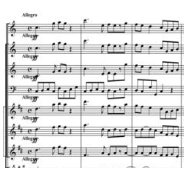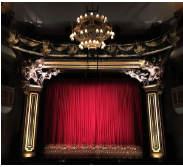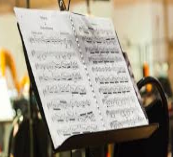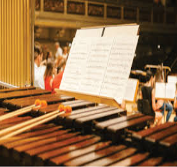The standards for Middle School Instrumental Music, Advanced Level enable students to advance technical and expressive skills. Students develop individual solutions to creative challenges through independent research, investigation, and inquiry of music idea and concepts. Students extend their knowledge of instrument-specific techniques while expanding their vocabulary of scales, arpeggios, and rudiments in more complex rhythmic patterns. Ensemble skills become more developed as students participate and collaborate with others to create and recreate music. Music literacy and performance skills are emphasized through performing and sight-reading progressively challenging literature. Students investigate connections between music skills and college, career, and workplace skills and investigate current and emerging technology in music. Opportunities are provided for students to participate in local, district, regional, and state events as appropriate to level, ability, and interest. Performances are an important part of the group activities. After-school rehearsal and performances may be required of students.
Band 7 or Director's approval
Essential Questions: How do I connect with, respond to, perform, and create music?
|
Quarter |
Quarter 1 |
Quarter 2 |
Quarter 3 |
Quarter 4 |
|
Unit Title |
Music Literacy and Improved Performance Skills Create More Opportunities |
How I Refine, Practice, and Rehearse to Improve |
My Pathway to Musical Independence |
Putting it All Together: Perform, Reflect, Explore, & Achieve |
|
Image Cue |
|
 |
 |
 |
|
Focus of the Story |
The year begins with technical skill, articulations, range expansion, and scale development while preparing for District Band auditions. Students will sight-read and play more advanced literature. |
Our progress continues working on scales and rudiments to expand one’s range. Performance techniques are refined and work on exercises to improve tone. Literature preparation for a Winter Concert is applied while practicing more advanced rhythms, counting and literacy through music theory . |
Learning to tune independently and the development of critical listening skills is developed. Preparation for tt. The ensemble will prepare for the District Band Assessment, a rigorous adjudication process by a panel of judges, including a sight reading component. |
Our year ends with a solo music selection which requires increased musicianship and individual ownership to perform, and prepare their own solo. The examination of music notation software is applied to music composition. Multiple musical career paths are also examined. |
|
Transfer Goals |
Use music literacy to demonstrate understanding of the elements of music and the ways they inform artistic performance and creative expression. Analyze, interpret, and evaluate musical works from a variety of cultures. Use technology as a strategic mechanism for improving music literacy and improving music performance. |
Understand and apply creative processes to guide the development of ideas, original works, and musical performance. Analyze, interpret, and evaluate musical works from a variety of cultures. Understand and find meaning in music as a form of community engagement through involvement as a performer, supporter, advocate, and audience member. Use music literacy to demonstrate understanding of the elements of music and the ways they inform artistic performance and creative expression. Explore and connect personal interests, experiences, and aspirations through vocation, advocacy, and arts patronage. |
Understand and apply creative processes to guide the development of ideas, original works, and musical performance. Analyze, interpret, and evaluate musical works from a variety of cultures. Understand and apply creative processes to guide the development of ideas, original works, and musical performance. Use music literacy to demonstrate understanding of the elements of music and the ways they inform artistic performance and creative expression. |
Understand and apply creative processes to guide the development of ideas, original works, and musical performance. Analyze, interpret, and evaluate musical works from a variety of cultures. Understand and find meaning in music as a form of community engagement through involvement as a performer, supporter, advocate, and audience member. Use music literacy to demonstrate understanding of the elements of music and the ways they inform artistic performance and creative expression. Explore and connect personal interests, experiences, and aspirations through vocation, advocacy, and arts patronage. Curate a portfolio of accomplishments, experiences, and performance materials exhibiting oneself as an artist. Use technology as a strategic mechanism for improving music literacy and improving music performance. |
|
Learning Targets |
I can read and count complex rhythms. I can demonstrate and apply mastery of key signature knowledge. I can demonstrate understanding of tempo markings. I can demonstrate mastery of District Band required scales, rudiments and prepared etudes. I can demonstrate proper tone and maintain intonation. I can create new rhythmic compositions, I can demonstrate mastery of advanced rhythms and counting, I can demonstrate understanding of form and musical terminology pertaining to tempo, articulations, and dynamics. I can sight read using the components of a sight reading system. I can create music in a brand new composition. |
I can demonstrate understanding of full ensemble playing and the creative process of concert preparation. I can demonstrate mastery of intermediate musical techniques. I can show understanding of listening skills and apply them to ensemble techniques. I can react to visual musical cues. I can write rhythms from music dictation. I can display growth in individual tuning techniques. I can use my thinking ability to use a system to sight read new music. I can demonstrate advanced percussion techniques on snare, mallets, timpani and accessory instruments. I can use my skills of reflection to evaluate my individual and ensemble concert performance. I can research how music relates in different cultures. I can communicate my musical preferences using music terminology. I can use a sight reading system in an increasingly timed manner to perform at a high level. |
I can apply concepts from my method book exercises to my assessment literature. I can display knowledge of the creative performance process. I can demonstrate growth of advanced music techniques in scales, etudes, exercises and technical facility. I can use my knowledge of aural skills to display growth. I can collaborate with an ensemble and adjust intonation to match. I can reflect on the creative process of concert preparation to improve. I can use a system to prepare advanced sight reading techniques. I can use inquiry to grow my knowledge of different musical time periods. I can be a principled concert goer by using proper concert etiquette. I can use inquiry to grow my knowledge of different historical musical time periods. |
I can create music based on my knowledge of theme and variations. I can reflect on the creative process of concert preparation and my growing skills as a solo performer. I can apply knowledge gained from ensemble performing to playing and individual solo. I can count and perform advanced rhythms. I can use a system of sight reading to advance my knowledge of music literacy. I can demonstrate an understanding of different forms of musical expression. I can use research to show my knowledge of contrasting musical styles in performers from different cultures and backgrounds. I can use the creative process to display knowledge of composing. I can display my knowledge of composition using technology. I can prepare musical techniques in fundamental playing. I can create new music through digital means. I can apply the laws governing the sharing of music in a digital community. |

